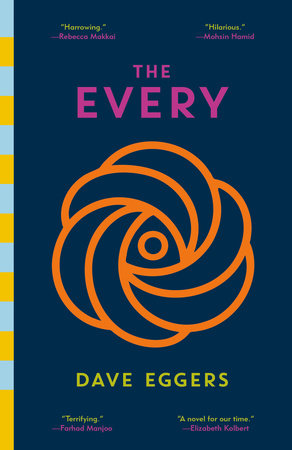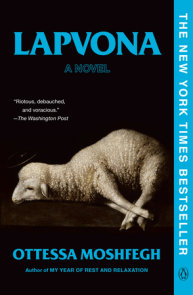READERS GUIDE
The questions, discussion topics, and other material that follow are intended to enhance your group’s conversation of Dave Eggers’s The Every, a follow-up to his best-selling novel The Circle, in which an all-powerful, all-seeing tech company gradually increases its domain to take over the lives, and minds, of its employees and devotees, including a new young saboteur named Delaney who infiltrates the company on a mission to end its reign.Questions and Topics for Discussion
1. Describe the mythology around the Every’s founders—Bailey, Stenton, and Gospodinov. Is there a line between any ostensible good intentions that helped them found the Circle, and the ego that led them to seek such control over the world? What about Mae?
2. The opening Note describes that “This story takes place in the near future” (page xvii). Which of the Every’s apps and other programs (as well as world events/circumstances, such as pandemics) already exist in the world you live in at the time of reading? Which seem most likely or imminent? How does your experience of those creations compare to how they’re used in the book?
3. Part of the way that the Every is able to gain such power is through the genuine, or at least convincing, presentation of its apps as good for the world; consider the data and stories that Ortiz tells to launch Stop+Lük. Did you find yourself admiring or in support of any of the ideas behind the apps? Which stood out to you as possibly beneficial to you personally, or to society?
4. On the other hand, the book describes several unsavory incidents and conditions around their programming—the Release, the hacking of the cloud that deletes all the scanned objects from Thoughts Not Things, the widespread shaming and exposure of violent and disturbing video content. Which of these seem closest to real-life events, and which seem possible?
5. How do the restrictions on travel, and encouragement of the Everyones to live on campus for their safety, compare to your experiences during and after the COVID-19 pandemic? What are the benefits and drawbacks of living in a smaller world, geographically, in the book and in your experience?
6. Delaney and Wes begin their journey of infiltrating the Every with noble aspirations, yet they also are keenly aware of exactly the kinds of technology that would appeal most to the Every leadership and Gang of 40. Did their ability to dream up these ideas strike you as suspicious at all? What does this say about the range of the human imagination, to know so precisely how to cause searing damage to ourselves? Consider Delaney’s thought about the use of smart speakers to spy on people at home for the sake of preventing child abuse and domestic abuse: “What did it mean for humans if this was true? In a moment she knew, unequivocally, that this is where the species was heading” (page 422).
7. If you lived in the time and place of the novel, do you think you would be an Everyperson, an Everyperson spy, a trog, an unhoused person, or something else?
8. The Every campus is attacked several times in the book to varying degrees. Given what we know about Delaney and Wes, and some of the others looking to take down the company, did you think those attacks came from outside or inside?
9. The book offers many examples of how the Every is fighting the “war on subjectivity” with quantifiable metrics—the beauty of a piece of art or a person’s face, the tone and attention given in a message sent personally to a loved one, the relevance of a piece of literature or film, the informed analysis of cultural criticism—which comes to a head in Delaney’s final proposal of SumNum. What makes algorithms like this so appealing to the people in the novel, and to people you know in real life, including yourself? What criteria would you use to draw the line at what can and cannot be quantified? Discuss any experiences you may have had with algorithms from your own life and whether they enhanced or hindered your experience of the world.
10. From the modernization of novels with FictFix to the underground cavern of the Reading Room, the book demonstrates several ways in which the Every especially attacks literature, publishing, and the media (there are no journalists or news outlets, even, anymore). How do certain elements of Eggers’s book fit the expectations for an optimal reading experience? Looking back, do you think you found it more enjoyable for any of these reasons? Do you find this happening in other things you read, digitally or in print?
11. Wes’s arrival at the Every speeds up and complicates many of his and Delaney’s plans for overthrowing the company. At what point do you think he turned over to their side, and why? Why do you think Delaney was able to resist—or did she?
12. What was so damning about Goleta’s visit to the Every campus? How does his indulgence in human instincts reflect any of the political scandals throughout American history, and why do you think a politician was the one to fall so hard from grace due to the Every’s odd wardrobe preferences? What about the bodysuits especially support the idea of radical transparency, and how do they simultaneously cause people to not see one another fully?
13. Describe the interaction between the Everypeople and the unhoused that live along the edges of the campus. Did this situation remind you of any real-life events? What did you think about the usurpation of the technology “gifted” by the company?
14. When it comes to commerce and consumer habits, the Every has a handle on almost every market or marketable product. Do programs like Are You Sure? and PrefCom really allow for a more streamlined and environmentally conscious marketplace, or are they supporting consumerism in another way? What kind of business model would truly minimize waste and wasteful shopping?
15. Discuss the saga that Delaney initiates with smart speakers. What role do they play in the book in increasing the scope of censorship and surveillance in all areas of human life? What does this suggest about the future of privacy, including its benefits and possible drawbacks? Compare these speakers, too, to Foucault’s paradigm of the panopticon—which is more pervasive and powerful?
16. Are there any glimmers of true love and affection in the world of the book? Consider Wes and Delaney’s original nighttime ritual of saying “I love you” and “I thank you.” Did reading this novel change how you view the people in your life whom you’d say you love?
17. How do the characters in The Every trade choice for convenience, and can you think of parts of your own life where you made this bargain and why? Who or what—besides you—benefited from your forfeiting that choice?
18. Kiki is a prime example of an exemplary Everyperson, whose life revolves around meeting the expectations of the apps that run her life: “If I want to meet my goals, I need to just be told how to achieve them—with far greater specificity and chronology. I’ve started that here in the Overlook, and I’ve gotten a lot better. The stress is gone, because all those decisions are gone,” she says after the bombing (page 503). Where do you see yourself needing a paring back of decision-making, like Kiki? And in what areas of your life does this kind of technology threaten to override one’s sense of free will and agency?
19. Agarwal being lured by the Every represents a kind of final straw in Delaney’s hope for preventing the total destruction of original opinion and dissent. Do you think Agarwal really believed their claims to support her work, or did she simply give up?
20. Why do you think Delaney trusted Mae in their final interactions? Who do you think came out victorious in the end?
21. Did reading this book make you examine any of your current habits—shopping, eating, communicating—with a different point of view? How has it shaped your understanding of our future in a globalized, technology-driven world?
Suggested Reading
The Testaments by Margaret AtwoodFahrenheit 451 by Ray Bradbury
The Circle by Dave Eggers
Constance by Matthew Fitzsimmons
Brave New World by Aldous Huxley
Klara and the Sun by Kazuo Ishiguro
No One Is Talking About This by Patricia Lockwood
Severance by Ling Ma
The Memory Police by Yoko Ogawa
1984 by George Orwell
A Tale for the Time Being by Ruth Ozeki
Station Eleven by Emily St. John Mandel




















